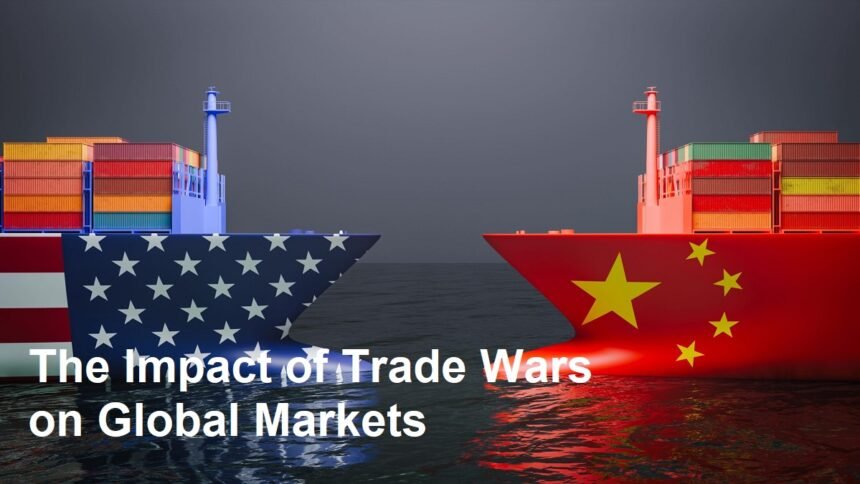Introduction
In today’s interconnected world, when two major economies clash, the ripple effects are felt everywhere. Trade wars—conflicts where countries impose tariffs or restrictions on each other’s goods—are one of the most disruptive forces in the global economy.
Whether you’re a business owner, investor, or consumer, understanding trade wars is essential. They can raise prices, disrupt supply chains, and slow down growth. In this article, we’ll break down how trade wars work, their economic impact, and what you can do to navigate these uncertain times.
What Exactly Are Trade Wars?
A trade war happens when countries retaliate against each other by raising tariffs, introducing quotas, or restricting imports and exports. It often starts with one country trying to protect its industries but quickly escalates when others fight back.
Key Characteristics of Trade Wars
- High tariffs on imported goods.
- Barriers to international business.
- Rising uncertainty in global trade.
A recent example was the U.S.–China trade conflict, which reshaped supply chains across the globe.
The Role of Tariffs in Trade Wars
Tariffs are essentially taxes on imported goods. While they’re meant to protect domestic industries, they often have unintended consequences.
Short-Term Effects of Tariffs
- Imported goods become more expensive.
- Domestic companies may temporarily benefit.
- Consumers end up paying higher prices.
Long-Term Effects of Tariffs
- Businesses face higher costs for raw materials.
- Supply chains shift, sometimes permanently.
- Overall economic efficiency declines.
The Economic Impact of Trade Wars
On Global Trade
Trade wars reduce the flow of goods across borders. According to the World Trade Organization, global trade growth slows significantly during these conflicts.
On Businesses
- Manufacturers: Struggle with rising costs of imported components.
- Exporters: Face shrinking international demand.
- Small businesses: Often hit hardest, with fewer resources to adapt.
On Consumers
The most visible effect is higher prices. Everyday items, from electronics to groceries, can become more expensive.
On Global Markets
Financial markets dislike uncertainty. Trade wars often trigger stock market volatility, currency fluctuations, and slower global growth.
Trade Wars and International Relationships
Beyond economics, trade wars also affect diplomacy. They can strain alliances and push countries to seek new trading partners. For example, during the U.S.–China dispute, other nations like Vietnam and Mexico saw increased investment as companies shifted production away from China.
Practical Tips: How to Navigate Trade War Uncertainty
Even if you’re not directly involved in global trade, trade wars can affect your wallet, your investments, or your business. Here are some actionable tips:
For Businesses
- Diversify Supply Chains
Don’t rely on a single country for raw materials or manufacturing. Spread your suppliers across different regions. - Review Pricing Strategies
Factor in the possibility of tariffs when setting product prices. - Look for Trade Agreements
Take advantage of free-trade agreements in other regions to cut costs. - Invest in Technology
Automation and smart logistics can help reduce reliance on high-cost imports.
For Consumers
- Be Price-Savvy
During trade wars, compare prices carefully and consider local alternatives. - Support Local Products
Buying local not only saves money but also strengthens domestic industries. - Plan Ahead for Big Purchases
If you know tariffs may increase costs (e.g., electronics, cars), buy before prices rise.
For Investors
- Diversify Your Portfolio
Spread investments across sectors and regions to minimize risks. - Watch Safe-Haven Assets
Gold and government bonds often rise when trade tensions increase. - Stay Informed
Follow news on global trade policies, as markets can react quickly to new developments.
Case Study: The U.S.–China Trade War
Background
The conflict began in 2018 when the U.S. imposed tariffs on Chinese goods, citing unfair trade practices. China retaliated with tariffs on U.S. exports.
Effects on Businesses
- Apple faced rising costs due to reliance on Chinese manufacturing.
- American farmers struggled as China reduced imports of U.S. soybeans.
Global Ripple Effect
- Other countries gained opportunities as production shifted away from China.
- Global supply chains in technology and manufacturing permanently adjusted.
Are Trade Wars Always Negative?
Interestingly, trade wars can sometimes create winners:
- Domestic producers may gain an edge if imports become too expensive.
- New markets may open for countries not directly involved in the conflict.
But overall, economists agree that trade wars are harmful in the long run. They reduce efficiency, slow growth, and weaken international cooperation.
The Future of Trade Wars
Increasing Global Tensions
As countries compete for resources, technology, and energy, the risk of new trade conflicts remains high.
Shifts in Global Trade
Nations are diversifying trading partners and strengthening regional trade agreements.
Role of Technology
Digital trade and e-commerce may reduce the reliance on physical goods, helping soften the blow of tariffs in some industries.
Conclusion
Trade wars are more than political disputes—they reshape economies, raise tariffs, and create real challenges for businesses, consumers, and investors. Their economic impact reaches across industries and borders, reminding us how interconnected the global trade system truly is.
While trade wars may bring short-term benefits to some, they often lead to long-term inefficiencies and higher costs. The best strategy is to stay informed, diversify, and adapt quickly.
Trade wars will continue to shape the global economy, but individuals and businesses can take steps to protect themselves.












